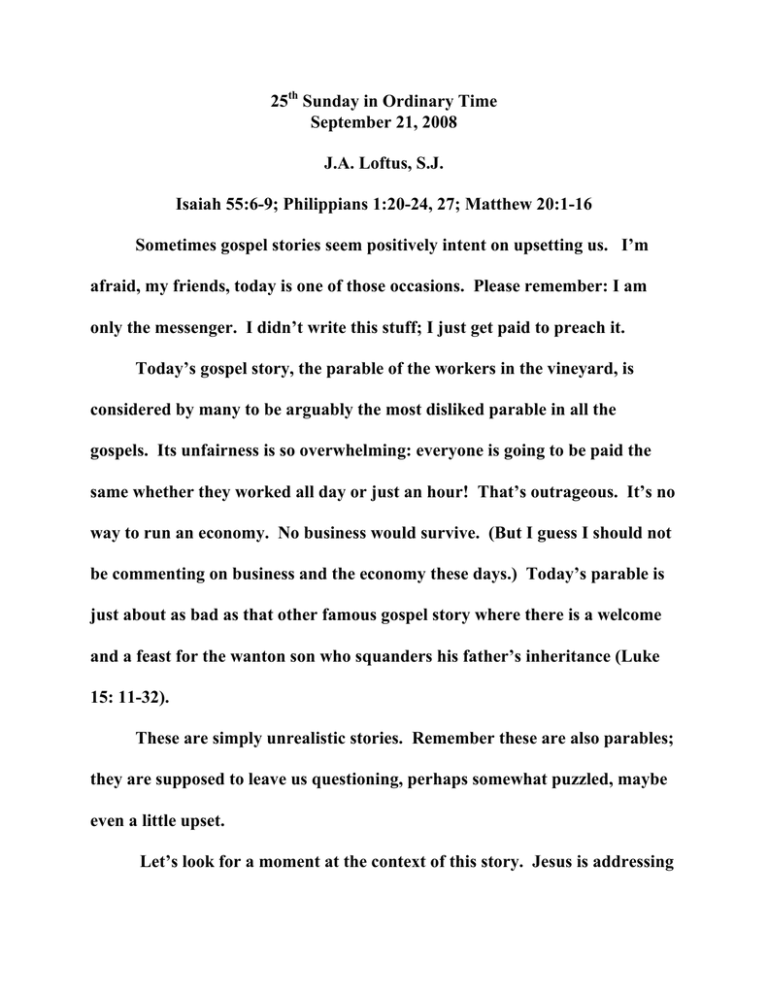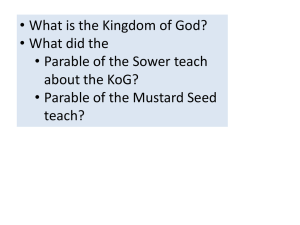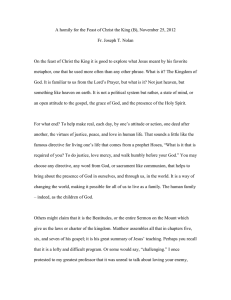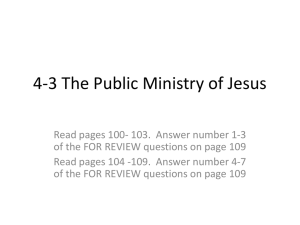25 Sunday in Ordinary Time September 21, 2008
advertisement

25th Sunday in Ordinary Time September 21, 2008 J.A. Loftus, S.J. Isaiah 55:6-9; Philippians 1:20-24, 27; Matthew 20:1-16 Sometimes gospel stories seem positively intent on upsetting us. I’m afraid, my friends, today is one of those occasions. Please remember: I am only the messenger. I didn’t write this stuff; I just get paid to preach it. Today’s gospel story, the parable of the workers in the vineyard, is considered by many to be arguably the most disliked parable in all the gospels. Its unfairness is so overwhelming: everyone is going to be paid the same whether they worked all day or just an hour! That’s outrageous. It’s no way to run an economy. No business would survive. (But I guess I should not be commenting on business and the economy these days.) Today’s parable is just about as bad as that other famous gospel story where there is a welcome and a feast for the wanton son who squanders his father’s inheritance (Luke 15: 11-32). These are simply unrealistic stories. Remember these are also parables; they are supposed to leave us questioning, perhaps somewhat puzzled, maybe even a little upset. Let’s look for a moment at the context of this story. Jesus is addressing his disciples. These are the ones who are already working hard in the vineyard. They are represented by Peter who asks Jesus in the verses immediately before today’s: “Look, Lord, we have left everything and followed you. What then will we have ( Mt. 19: 27)?” Peter’s question, you may remember, is prompted by the wealthy young man in the verses immediately before. Here is the young man who has “many possessions” and cannot bring himself to follow Jesus (Mt. 19: 16-22). Too many creature comforts. So Peter and the other disciples who have left everything want to know, frankly, what’s the payoff? What am I going to get out of it all? It is a terribly human question with which, I suspect, most of us, at least at times, can relate. Jesus tries to reassure Peter and the others that they will receive back a hundred fold and inherit unimaginable riches in this life and in the kingdom to come. But Peter’s question offers Jesus another “educable moment.” The disciples, Peter (and perhaps we), are still missing something. One can hear faint strains of Isaiah’s first reading today: God’s ways are not your ways, nor are God’s thoughts your thoughts. We are asked to let go of our usual social contracts and our usual sense of fairness and even justice and let God be as generous and gracious as only 2 God can be. But the parable is still a bit bizarre. Do you think Jesus can be for real here? Is this really my world and your world he is addressing? Everyone gets paid equally? Everyone gets treated equally? It doesn’t matter how long or how hard I’ve worked? What is Jesus really trying to say? Let’s pay attention to something that often goes unnoticed about this story. The laborers the owner comes upon all throughout the day are idle, the story tells us. The gospel mentions three times that they are just standing around idle. The story doesn’t say they are lazy, indifferent, or unable to work. It says they just have not been hired; they don’t think there is any work to do. They were not invited to work. No one told them there was anything to do that day. This is the sub-text here in Matthew’s story. Jesus is reminding his disciples and us that, in fact, all have already been hired to labor in the vineyard of God’s kingdom. No one can sit around idle. You and I are by our common baptism already called to be day-laborers for God. Some go out to work in the Kingdom at dawn, some at noon, and some at what appears to be the last minute. And all will be rewarded with whatever is needed for today. God does not pay less; God does not pay more. But God does pay lavishly. 3 Fear not! My brothers and sisters, we are really being asked today to check our usual ego-centric obsession with “fairness” in life at the door of the Kingdom. What ego-centric obsession, you ask? Many of us have a continually droning tape that plays between our ears all day, every day. It says we have a right to feel offended when the last are paid the same as the first. We have a right to feel cheated when someone gets paid the same as I do for far less work. As theologian John Shea puts it: “Most of us have this tape running continually. This makes us, in the language of the parable, grumble-ready.” And grumble we do. Just listen to us grumble sometimes; we do it well. Jesus suggests that everyone is called by God to the work of God’s kingdom. Everyone! We’re not called to the same task, nor in the same way. But the real owner of the vineyard is shameless in the diversity of the ways he calls people. All people differently. What is paramount is the work of God’s kingdom. And we are all called to that work. This uncomfortable gospel story is not really a about fairness at all. It is about generosity in pursuing your vocation and mine as a laborer in God’s kingdom. And not worrying about “the other guy.” Listen to the song of the prophets of Israel again: “For my thoughts are 4 not your thoughts, nor are my ways your ways.” A final thought: in the building of God’s kingdom, Ernest Hemingway, of all people, offers a word of advice. “Never mistake motion for action.” There is real work to do, real action for God’s kingdom demanded, and its reward will be fullness itself. Jesus says today: Don’t just sit there, do something! Today’s gospel is intent on upsetting us. That’s what God is best at. 5





